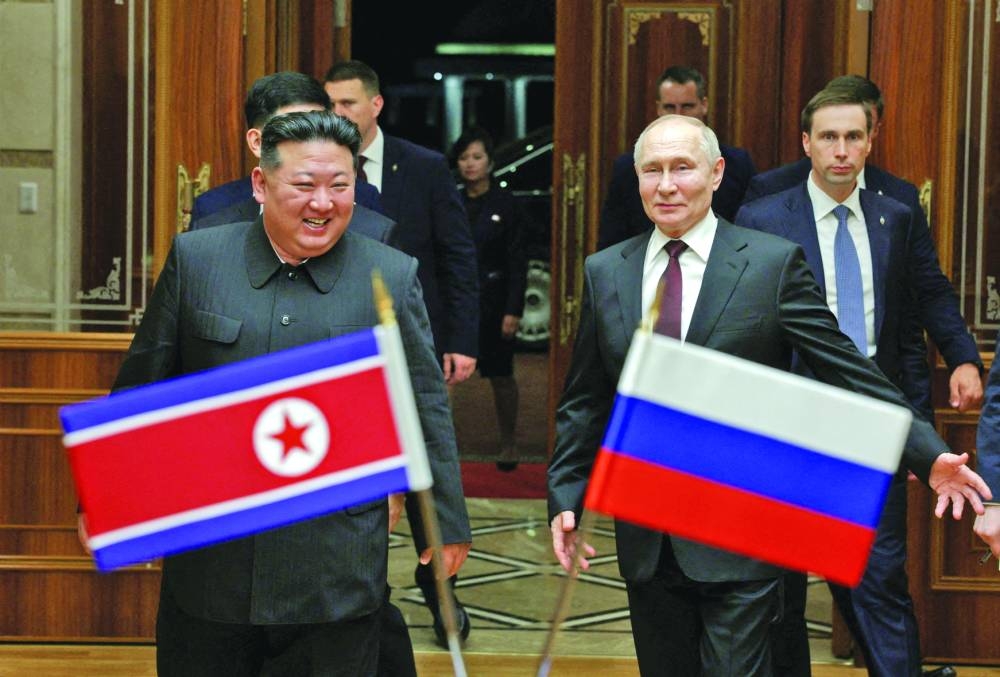Russian President Vladimir Putin arrived early today in North Korea, vowing to deepen trade and security ties with the reclusive nuclear-armed state and to support it against the United States.
The trip is Putin’s first to the isolated nation in 24 years, with a recent confrontation between North and South Korean troops on the countries’ shared border highlighting regional security tensions.
The two Koreas have remained technically at war since their 1950-53 conflict and the border dividing them is one of the most heavily fortified in the world.
Russian state media showed Putin and North Korean leader Kim Jong-un shaking hands, embracing and talking beside Putin’s plane.
It touched down in Pyongyang around 2.45am following a stopover in Russia’s far east. The leaders then rode in the same limousine and walked together into Putin’s hotel.
The US and its Asian allies are trying to work out just how far Russia will go in support of the North Korean leader, whose country is the only one to have conducted nuclear weapon tests in the 21st century.
In a signal that Russia, a veto-wielding member of the UN Security Council, is reassessing its entire approach to North Korea, Putin praised Pyongyang ahead of his arrival for resisting what he said was US economic pressure, blackmail and threats.
In an article published by North Korean state media, Putin praised “Comrade” Kim, and promised to “jointly resist illegitimate unilateral restrictions”, to develop trade and strengthen security across Eurasia.
“Washington, refusing to implement previously reached agreements, continuously puts forward new, increasingly stringent and obviously unacceptable demands,” Putin said in the article, printed on the front page of North Korea’s Rodong Sinmun, the ruling Workers’ Party mouthpiece.
“Russia has always supported and will continue to support the DPRK and the heroic Korean people in their opposition to the insidious, dangerous and aggressive enemy.”
Putin issued a presidential order on the eve of the visit, saying that Moscow was looking to sign a “comprehensive strategic partnership treaty” with North Korea.
His foreign policy adviser, Yuri Ushakov, said it would include security issues.
Ushakov said the deal would not be directed against any other country, but would “outline prospects for further co-operation”.
Putin noted the Soviet Union was the first to recognise the Democratic People’s Republic of Korea (DPRK) founded by Kim’s grandfather, Kim Il-sung, less than two years before the 1950 Korean War.
North Korean state media also published articles praising Russia and supporting its military operations in Ukraine, calling them a “sacred war of all Russian citizens”.
Putin’s state visit comes amid US accusations that North Korea has supplied “dozens of ballistic missiles and over 11,000 containers of munitions to Russia” for use in its invasion of Ukraine. South Korea, a staunch US ally, has raised similar concerns.
The White House said on Monday that it was troubled by the deepening relationship between Russia and North Korea.
The US State Department said it was “quite certain” Putin would be seeking arms to support his war in Ukraine.
Moscow and Pyongyang have denied arms transfers but have vowed to boost military ties, possibly including joint drills.
Russia is due to exceed the whole North Atlantic Treaty Organisation (Nato) military alliance on ammunition production this year, so Putin’s trip is likely aimed at underscoring to Washington just how disruptive Moscow can be on a host of global crises.
Russia in March vetoed the annual renewal of a panel of experts monitoring enforcement of longstanding UN sanctions against North Korea over its nuclear weapons and ballistic missile programmes.
The visit will include one-on-one discussions between the two leaders, as well as a gala concert, state reception, honour guards, document signings and a statement to the media, Russia’s Interfax news agency quoted Putin’s aide Ushakov as saying.
Russian Defence Minister Andrei Belousov, Foreign Minister Sergei Lavrov, the ministers for natural resources, health, and transport, the heads of the Russian space agency and its railways, and Putin’s point man for energy, Deputy Prime Minister Alexander Novak, will be part of the delegation.
North Korea has been under UN sanctions for its ballistic missile and nuclear programmes since 2006, and those measures have been strengthened over the years.
The Security Council has been divided over how to deal with Pyongyang.
Russia and China say more sanctions will not help while Washington and its Asian allies accuse Beijing and Moscow of emboldening North Korea by shielding it from more sanctions.

Putin with Kim Jong-un during a meeting in Pyongyang. – Reuters
